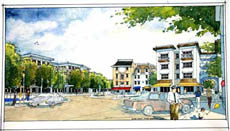Laurent, South Dakota, will soon be the home of the nation’s first sign language town. The idea came from Marvin Miller, deaf from birth, and his mother-in-law M.E. Barwacz. Named after the man who brought sign language to America from France, Laurent Clerc, the town is expected to begin phase one of building this spring. The location was chosen because of its proximity to Interstate 90 and the potential for about 2,500 residents. The directors of the town hope that it will have political and economic influence on the surrounding county.
This project could be a huge milestone for the deaf community in America.
“Society isn’t doing that great a job of, quote-unquote, integrating us,” Miller told the Indianapolis Star, through an interpreter. “My children don’t see role models in their lives: mayors, factory managers, postal workers, business owners. So we’re setting up a place to show our unique culture, our unique society.”
Not just a town for deaf people, anyone wanting to experience living in a town whose main language is American Sign Language is welcomed to join the community. Even people who aren’t fluent in sign language but would like to learn it are encouraged. Several issues face the town, however. Maintaining Laurent as a signing town may be difficult if the hearing population increases over the deaf population.
“We know that if either population becomes too dominant, the other will become uncomfortable and feel unwelcome,” Marvin Miller told the Laurent, S.D. website’s Newsroom.
Another issue is the language. When a group of people speaking the same language are confined to a region, they tend to put their own spin on the language. This might interfere with the teaching of American Sign Language in the town.
“There are a lot of different signs for one word. The town might have its own dialect. They have to be careful,” said Ana Martinez, vice president of the sign language club at Guilford.
Started last semester, the club was formed for its members to learn sign language together. ‘ They meet every Wednesday at 8 p.m. in Founders to hold a lesson taught by one of the members. In their study of sign language, they have found that many people do not have much respect for it.
“It will be interesting to see,” said Madeleine Pope, club president, “if the country will take {the town} seriously.”
Isolation is another worry. Many deaf people in America are beginning to use things like cochlear implants to improve their hearing, and new technology makes it possible for early detection of hearing loss. ‘ People living in Laurent may be missing out on such opportunities.
“I understand the desire to be around people like ourselves … but I don’t think it’s very wise,” said Todd Houston, executive director of the Alexander Graham Bell Association for the Deaf and Hard of Hearing to the New York Times. ‘ “This is a little bit of circling-the-wagons mentality, if you ask me.”
But Miller believes that for people who are comfortable with their lack of hearing, Laurent will be a wonderful place to interact with others on the sign language level. Some are not eligible for things like cochlear implants, and others simply do not want them.
“I do not want one for myself,” he told the New York Times. “I am very happy being deaf. To me, this is like asking a black or Asian person if he/she would take a pill to turn into a white person.”
Planning sessions for the town took place all last week and will continue throughout the spring, until phase one of the town-building of residential homes begins.

